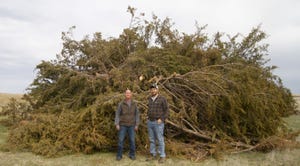Value of gain vs. What might be?
Make sure your cost of grain is more than the weight gain was worth.
February 25, 2022

Every week when I write this column the thing that is top of mind is profit. When we are in the market for breeding stock we need to know and understand the difference between intrinsic value and actual value.
There is a way to sell value into the market and get paid more for it than what it is worth. Earlier this week there was an article on this website that suggested doing the opposite of that. Basing purchases off of old rules of thumb may be what led to statistics like cow/calf people only making money three years out of 10.
The article suggested selling five animals and using their combined value to buy a bull. The author used five weight steers, eight weight steers, and fats. First thing that stood out to me was the poor Value of Gain (VOG) on the eight weights. In that example he devalued his feed by putting the weight on those animals.
To put it a different way the cost of gain cost more than what the weight gain was worth. Then he used fats which are an over-valued animal. Here he added value to feed, and the feeder cattle that ate it. Then instead of capturing that goodness and putting some money in his pocket he suggests he can bid it away on a bull. Here we are, giving money and value away.
In his article there was no mention of cull value or a feed charge to the bull. If we are going to have a bull around for six years like he suggested that bull will get big and eat a lot. In my local area many people have their bulls shut up and are feeding them. With current hay prices an 1,800 pound bull will consume enough hay in five months to equal the value of a five-weight steer. If we aren’t charging ourselves for this, we are giving away our feed.
I did my own calculation on what a bull is worth. I used the other author’s bull to cow ratio, this week’s kill value, and the conventional way of keeping bulls in Southeast Nebraska, meaning we’re going to feed him hay for five months. I then charged the cowherd a breeding fee for his service. In this scenario the bull is worth $2,600.
Here’s another thing, I think his bull to cow ratio is too low. If that is all he can cover we need to buy better bulls. If that is all we run him with and he isn’t jumping the fence I would be concerned that he’s not an aggressive enough breeder.
If we get more work out of our bull we can bump his purchase value up to $7,250. I know I can find a good bull for less than that, which brings me back to the profit motive. I’m not going to bid away all my margin and I’m going to get more value out of that bull than I paid for him.
Female sales were even more interesting this week than they were last week. The stockyards got more cows in than they were expecting.
One sale had only bred females advertised. They ended up with a bunch of pairs in the run. If you’re going to take cattle into a special auction like this give them enough advance notice to get your stock advertised. There were no pair buyers in attendance at the sale and the little coupons running along side had no extra value. Some were even discounted bringing less than breds. Here we are again giving value away.
Some marketing experts will tell you to ship your cows into a better market. We need to do a better job vetting our experts, let’s get that right. If that expert doesn’t warn you about knowing the culture of selling bred stock or the area you plan to ship them too, ignore them.
There were train loads of females from the drought areas of WY and MT shipped into NE this week for these special female sales. The second calvers were the only ones that sold almost decent, bringing $400-$500 dollars back of local cattle the same age. The rest sold for $60 per head over the scale.
I know what it cost to ship cattle that distance, because I do it sometimes when I buy feeders. I know what it costs to sell cows on those special female sales because I do that sometimes too. This transaction netted five figures less for these guys than if they had just sold them at home for slaughter value. People you have got to put some effort into marketing.
If you’re going to do this long haul stuff you’ve got to know what you’re selling, the culture of the area, and how buyers will perceive what you’re doing. These were nice looking cows, and a great buy for the person who bought them. Here we are again, another example of someone giving away value again this week.
If we are going to sell breeding stock right now it is clear what the buyers are demanding. If we are going to sell bred heifers they must weigh over 1,100 pounds and even better if they weigh over 1,200 pounds. (I get misquoted all the time. I didn’t say they have to be that big, the market prices are saying that.)
The discount is so heavy for anything under 1,100 pounds you’d be better off to keep them and calve them at home.
Fat is the prettiest color a cow can be. Fat, bred cows are selling much better than plain cows. We all want our stock to be in working condition, and a mature weight of 1,250 pounds.
The thing is when we go to town and buy them we want them in show condition and big. As a seller the market signal is clear it is worth feeding the condition on them, even at today’s feed costs. As a buyer there is value in the less conditioned cows. The one or two and done cows are looking like a super buy right now as well.
Did you notice how many times we left money on the table? This is an 80-100 billion dollar industry and money is left on the table like this all the time. Even our “experts” suggest leaving money on the table!
With market literacy, like what I teach at my schools, we can capitalize on these opportunities because they become easy to spot. These opportunities are exactly why a young person can get in on the ground floor and grow a business just like I did.
When I woke up yesterday morning and heard Russia invaded the Ukraine I thought the markets would get all scrambled. That didn’t happen. The VOG held steady all week. The VOG is highest on cattle under 600 pounds. It is paying well to grow these cattle. It is also clear buyers are turning their noses up at cattle under 500 pounds as that is where the best VOG is. On cattle over 600 pounds VOG is getting pushed below COG. This is where we need to know and understand the difference between VOG and monetary gain. This is another place money is left and the table and the “experts” don’t understand.
This week feeder bulls took a discount up to $20 back. Replacement heifers caught a $4-$11 dollar premium. And I did see some program cattle catch a $9 dollar premium.
About the Author(s)
You May Also Like


.png?width=300&auto=webp&quality=80&disable=upscale)


